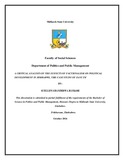Please use this identifier to cite or link to this item:
https://cris.library.msu.ac.zw//handle/11408/1957| Title: | A critical analysis of the effects of factionalism on political development in Zimbabwe, the case study of Zimbabwe | Authors: | Shandirwa, Suellen | Keywords: | Factionalism, politics ZANU PF, Zimbabwe |
Issue Date: | 2016 | Publisher: | Midlands State University | Abstract: | Factionalism in ZANU PF has brought about several challenges to political development in Zimbabwe, of course MDC has had its own fair share of factionalism but the impacts were never felt like the current factionalism in ZANU PF. The rampant factionalism in ZANU PF ballooned since the December 2014 conference where several ZANU PF members faced the ZANU-PF axe including the then vice president Joyce Mujuru ,since then poor Zimbabweans still continue to feel the heat of factionalism within the ruling party. This factionalism within the ruling party is enrooted in succession issues, affiliate organization intervention, divisive slogans, differing party policies and new ideologies, greediness and selfishness and policy inconsistency amongst a few. Moreover, the current ZANU-PF factionalism can be justified as democratic contestation of power, hence the phenomena of the multi-party system owes its credit to the democratization principles in Zimbabwe ,although factionalism within the ruling party poses great threats to political development in Zimbabwe, the brighter side of the democratization process should not be overlooked. Hence the purpose of this research is to critically analyze the effects of factionalism on political development in Zimbabwe paying particular attention to ZANU-PF. This study was purely a mixed methods model in nature and the data soliciting techniques included questionnaires and in-depth interviews that targeted ZANU-PF officials, ZANU-PF members of Parliament, political science students, preferably those affiliated to ZANU-PF, political activists like YARD currently led by a former ZANU-PF legislator, Temba Mliswa to acquire detailed information about the serious effects factionalism poses on political development in Zimbabwe. Moreover, purposive or judgmental sampling was used as the research only targeted people with the knowhow of the current ZANU-PF factionalism. Content and thematic analysis were employed by the researcher in her research together with document analysis. Moreover, professionalism and confidentiality were observed by the researcher as part of her ethical conducts, the researcher did not force anyone to participate in her study neither did she record the interviews without the interviewee’s consent. Using descriptive statistics to analyze data, the researcher found that although factionalism in ZANU-PF was a clear indication of the democratization process in Zimbabwe, many people suffered because of it. Effects of ZANU-PF factionalism to political development which were discussed in the study included worsening economic woes, poor service delivery, policy paralysis, misuse of public funds, multiparty and civic protests amongst a few. ZANU-PF is recommended to make sure that it introduces robust education on political leadership to its party members, and that it shuns divisional slogans, introduction of stiff penalties on media abuse is recommended and an introduction of a more robust dispute resolution system is recommended to curb factionalism in ZANU-PF that poses as a great threat to political development in Zimbabwe. | URI: | http://hdl.handle.net/11408/1957 |
| Appears in Collections: | Bachelor Of Science In Politics And Public Management Honours Degree |
Files in This Item:
| File | Description | Size | Format | |
|---|---|---|---|---|
| SUELLEN FINAL.pdf | Full Text | 634.9 kB | Adobe PDF |  View/Open |
Page view(s)
172
checked on Apr 19, 2025
Download(s)
64
checked on Apr 19, 2025
Google ScholarTM
Check
Items in MSUIR are protected by copyright, with all rights reserved, unless otherwise indicated.



